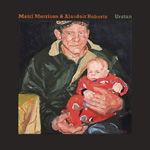|
|
 |
Dusted Reviews
Artist: Mairi Morrison & Alasdair Roberts Album: Urstan Label: Drag City Review date: Mar. 26, 2012 |

|
|
|
 |
Urstan continues Scottish bard Alasdair Roberts’s turn toward traditional folk songs and away from his own material. Here, however, Roberts turns to a rather different musical tradition, replacing the English and Scottish balladry of 2010’s Too Long in This Condition with the Gaelic musical tradition of the remote isles of Northern Scotland.
Roberts himself is a lowlander and a non-speaker of Gaelic, and thus approaches the music from something of a remove. Mairi Morrison, from the Isle of Lewis (and a native Gaelic speaker), thus provides most of the lead vocals here. The whole endeavor is sponsored by Ceòl’s Craic, a Glasgow club that promotes the Gaelic arts, and whose logo and name appear prominently on the packaging. The rather official character of the project (the numerous organizations credited make it feel something like a governmental cultural preservation project) doesn’t translate to the music itself, though, which embraces both traditional and playfully eclectic styles.
Roberts and Morrison perform here with a full band (and a rotating cast of guest musicians), and Urstan has a looser, more live feel than anything Roberts has previously recorded. Indeed, the album is full of superlative performances, and exudes an uncommon level of energy and joy, even at its more melancholic moments, and is a far cry from Roberts’ often cold and hermetic (but excellent) solo performances. Despite Morrison and Roberts’s being the featured performance, this is clearly a group effort, a fact further underlined by the band-credited arrangements.
As for the arrangements themselves, they run the gamut from the complex, Pentangle-inspired Celtic jazz of the opening track, “Mìle Marbhphaisg air a’ Ghaol” to the bluesy, almost Cajun-flavored “Làrach do Thacaidean” and the more traditional and pan-Celtic “Fiullaigean,” which incorporates several Irish fiddle tunes into a 19th century wedding song from the Isle of Lewis. Elsewhere, Roberts sticks more closely to his usual guitar-based approach, but augments it with an unexpected and perfectly deployed brass section (“The Laird o’ the Drum,” “The Tri-Coloured House” ). The album’s crowning moment, however, is a new version of Roberts’s “The Whole House is Singing” (originally featured on 2003’s Farewell Sorrow), which finds Morrison incorporating a Gaelic counter-melody. Although some of the downtempo tracks (“E Ho Leigein,” a lullaby meant to be sung while milking a cow) appear a bit lackluster alongside the fuller arrangements, Urstan is consistently exciting (and sometimes breathtaking) from start to finish.
For those non-Gaelic-speaking listeners (and that’s most of us), full translations are provided, and Roberts and Morrison provide contextual notes for each track. Like most of Roberts’s work, Urstan is a superlative effort.
By Michael Cramer
|







